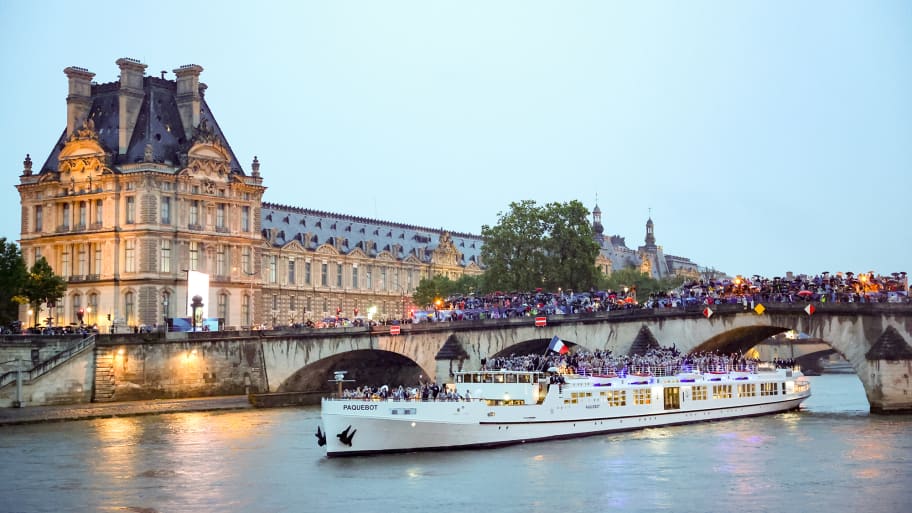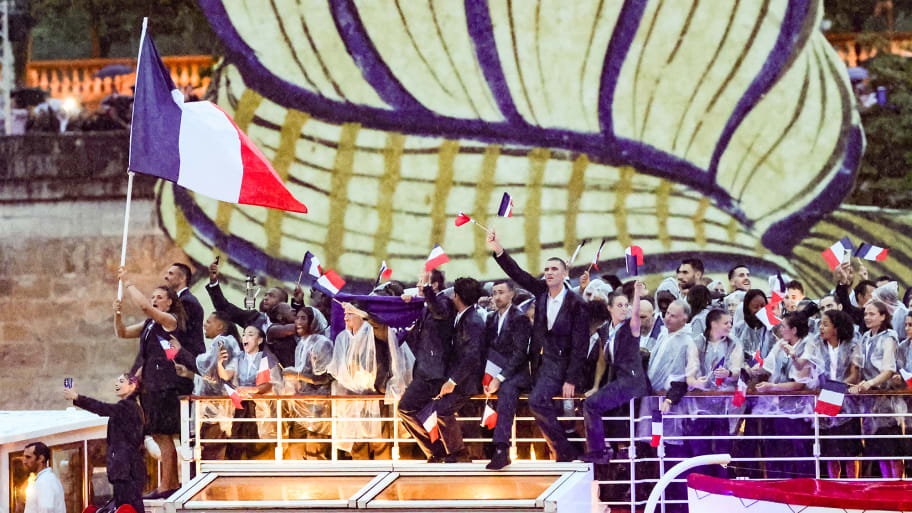
Check out Sports Illustrated’s Daily Rings, our daily Olympics podcast from Mitch Goldich and Dan Gartland. Subscribe wherever you get your podcasts (Apple, Spotify) and find clips on SI’s YouTube page.
PARIS — For a while, in the days leading up to Friday’s Olympics opening ceremony, Paris in 2024 felt like Tokyo in ‘21 or Beijing in ‘22: the crowds emptied out, silent but for wind drifting through barren squares.
But then—grâce à Dieu—police opened the barriers, and for the first Olympics since Pyeongchang, in 2018, fans poured in. Some 300,000 of them gathered along the banks of the Seine, huddling under umbrellas and waving flags. They leaned out of Mansard windows and held banners off balconies. They watched from restaurants overlooking the water and on TV at cafés far from the city center.
The goal of the Opening Ceremony, organizers said before the event, was to celebrate the city of Paris, and it did that, with athletes in bateaux-mouches wending their way down the Seine, past the Louvre and Notre-Dame toward the Eiffel Tower, while performers leapt on bridges and rooftops, despite a downpour. But the truest tribute it could offer was to the people of the host city, who live life in public.
It was for this reason that the terrorist attacks of Nov. 13, 2015—which killed 130 and injured 416 at a stadium, a theater and half a dozen cafés and restaurants—so shook Parisians. This is a people that offers discounted museum tickets to the unemployed; everyone, they believe, should have access to culture. Those public spaces are crucial in a city whose average apartment size barely tops 600 square feet, and any threat to them constitutes a threat to the city itself.
And indeed there were threats this week: A Russian chef was arrested on Sunday on suspicion of plotting with foreign authorities to stage acts of “destabilization” during the Games. Early Friday morning, a series of coordinated arson attacks shut down major railways into and out of Paris, causing chaos but no injuries. (And not directly affecting the Olympics; none of the areas targeted—Courtalain, southwest of Paris; Croisilles, to the north; and Pagny-sur-Moselle, to the east—are within 60 miles of the capital.) Officials estimated some 45,000 police had been deployed across Paris on Friday. Parisians griped about having to show government-issued QR codes to access their homes and workplaces. These Olympics, as are most Olympics, have been controversial among the locals, with their focus on clearing out homeless people and cleaning up the neglected suburbs only now that foreigners might visit them. Many disgruntled Parisians left the city entirely.
Those who stayed saw the show of a lifetime on Friday. The Tokyo and Beijing Olympics deserved fans, too. But Paris got them, and they brought the ceremony to life.

This was the first Opening Ceremony to take place through an entire city rather than in a stadium, which in some ways made it perfect for television—no one present got to see everything. But it was the performers’ relationships with the crowd that made the daring spectacles work.
The event poked fun at various national stereotypes, from an accordionist on the Pont d’Austerlitz to a woman dancing in a dress made of croissants to a cast of 80 Moulin Rouge cancan dancers. A dozen headless Marie Antoinettes danced in the windows of La Conciergerie, where the country’s final queen was imprisoned before she met the guillotine. A gendarme dressed as Joan of Arc rode a metal horse down the Seine.
But in this moment of high tension, amid a snap election that has essentially left the country without a government, the ceremony also took care to include groups historically marginalized in French society: French Moroccan comedian Jamel Debbouze and soccer star Zinedine Zidane, who is of Algerian descent, met and handed the Olympic torch off to a group of kids who ran through neighborhoods. A fashion show on the Passerelle Debilly featured drag queens and young French designers. Just the presence of pop star Aya Nakamura, who was born in Mali and grew up in the neglected Paris suburbs, offered a rebuke to far-right groups, some of which had complained in the leadup of the Games about her use of multilingual slang and questioned whether she was French enough to perform. She strutted in front of the Académie Française—the arbiter of the French language—while the marching band of the Republican Guard accompanied her. Loud cheers greeted them all.
Even the final torch relay offered symbolism, as a growing group that included four-time NBA champion Tony Parker trotted with the flame into the square in front of the Louvre, then the Tuileries—both original private royal spaces that have since been opened to the public. Their white uniforms shone through the darkness and the wet sand. Judo star Teddy Riner and track star Marie-José Pérec, who were both born in Guadeloupe, lit the cauldron. It became a hot-air balloon, hovering above the garden. At this sequence, for the first time all night, the crowd largely fell silent.
And finally Celine Dion, the Canadian pop star who is beloved in France, performed for the first time in four years. She suffers from stiff person syndrome—an incurable neurological condition that causes muscle spasms, including of the vocal cords—which has caused her to cancel concert after concert. But on Friday, there she was on the second story of the Eiffel Tower, dressed in white, belting out French legend Édith Piaf’s “Hymne A L’amour” as an entire city cheered. After the final note, she appeared to choke up as she gazed out across Paris. Hundreds of thousands of soggy people, braving a rainstorm to watch their city on display, gazed back.
This article was originally published on www.si.com as Olympics Opening Ceremony a Fitting Tribute to Paris and Its People.







